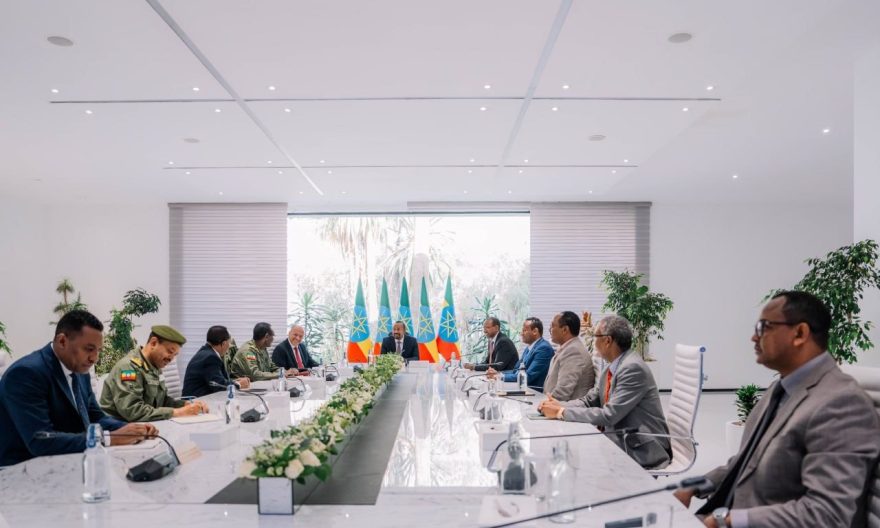
Ethiopia is putting in place a multitude of problem-solving mechanisms to address the existing and new political challenges resulting from recent circumstances, such as the conflict in the northern part of the country: the National Dialogue, the Transitional Justice, and the National Rehabilitation processes.
There has been a firm commitment from the government side to implement these mammoth measures. From signing and firmly implementing the Pretoria peace deal to forming the National Dialogue Commission, the government has been taking concrete steps to usher in the country on the path of lasting peace and stability. The bold measure of the incumbent to sit with armed groups and its consistency to enter into a peaceful dialogue have achieved relative peace in the northern part of the country despite ongoing conflicts in some pockets of Amhara and Oromia states.
The Pretoria Peace Agreement signifies a mature and resolute decision to prevent future generations from inheriting a legacy of winners and losers characterized by animosity, the National Security Council said.
At different times, the government has called on the armed entities to lay down their arms and find peaceful solutions to whatever their legitimate and political demands are. To give justice to victims and probe claims of war crimes and human rights violations, the government is also facilitating a conducive environment for the implementation of transitional justice. Transitional justice and national dialogue are imperative as conflict resolution tools in the political landscape of severely divided and post-conflict societies like Ethiopia.
On the other hand, to protect civilians, stop the bloodshed, and restore law and order, the government has been forced to use force. In this regard, the incumbent has made it clear that it has a constitutional mandate to keep law and order and ensure security. It is the government which has the right to a monopoly of violence.
On the other hand, to rehabilitate militants and rectify victims, a rehabilitation commission has been formed and commenced work.
The country is now toiling to make the ongoing activities a success with the national dialogue embracing embarking on national discussion. In this regard, the support of all Ethiopians and the international community is much needed. In a statement, the Ethiopian National Security Council underscored the need to build up on the ongoing efforts to mend the deep-seated national fractures through an inclusive approach.
The process of identifying candidates who would participate in the national dialogue has been conducted in 10 regional states and two city administrations, where some 12,294 participants have been identified from 679 districts, it said.
The National Rehabilitation Commission is working to ensure the reintegration of ex-combatants into society through the ongoing Disarmament Demonization and Reintegration (DDR) process, as the Council pointed out.
Activities are underway to reinstate citizens displaced due to the conflict in the northern part of the country and security problems in the Oromia and Amhara regions to their homes. The leadership of the Oromia and Amhara Regional States has managed to return many IDPs from camps to their homes, according to the statement.
“We have therefore put in place three pathways that would enable us to rectify our historical shortfalls through resolving past political challenges through inclusive national dialogue, the implementation of transitional justice, and upholding peaceful political avenues, the statement underscored.”
These seeming toll orders are a must-do and will be instrumental to restoring lasting peace, redressing the years of political divisions, and paving the way for state building. In this regard, the contribution of all Ethiopians and the cooperation of the international community are imperative to making these grand initiatives a success.
The statement said the challenges that Ethiopia is facing cannot be resolved only through corrective measures; they require efforts to heal wounds that the country has inherited from history.
We have therefore put in place three pathways that would enable us to rectify our historical shortfalls through resolving past political challenges through inclusive national dialogue, the implementation of transitional justice, and upholding peaceful political avenues, as the statement underscored.
Peaceful political transition is not an end by itself but a means to ensure other overarching political goals, the council noted.
Under the objective reality in Ethiopia, a government that assumes political power by winning elections should not just make decisions on overarching political issues; it should also address other significant issues that require inclusive engagement with all stakeholders.
Stating the commissioners of the National Dialogue, who were appointed to serve in the institution, are of high caliber and rich experience, and the statement indicated the law has empowered them with extensive power to conduct their duties of coordinating and conducting an inclusive national dialogue.
The commissioners have now charted out extensive outlines on how inclusive dialogue should be conducted by consulting with pertinent stakeholders, the council added.
The process of identifying candidates, who would participate in the national dialogue, has been conducted in 10 regional states and two city administrations, where some 12,294 participants have been identified from 679 districts, it said.
According to the statement, the commission is expected to commence dialogue on regional levels within a few weeks.
The implementation of transitional justice, which incorporates international best practices, has also been a viable strategy to break the dichotomy between transgressors and victims in Ethiopia, it said.
The council further noted that over the past several historical incidents, various transgressions, heinous activities, and violations of basic human rights have been conducted in the country.
“Those who have hitherto assumed political power condemn and punish others by shifting the blame on others it considered as transgressors. Such an approach will never promote the prevalence of justice. It would only produce regrets and escalation of revenge. This is the major reason why a vicious circle of the desire for vengeance, revenge and unforgiving have prevailed in the country” the statement elaborated.
BY STAFF REPORTER
THE ETHIOPIAN HERALD THURSDAY 2 MAY 2024




